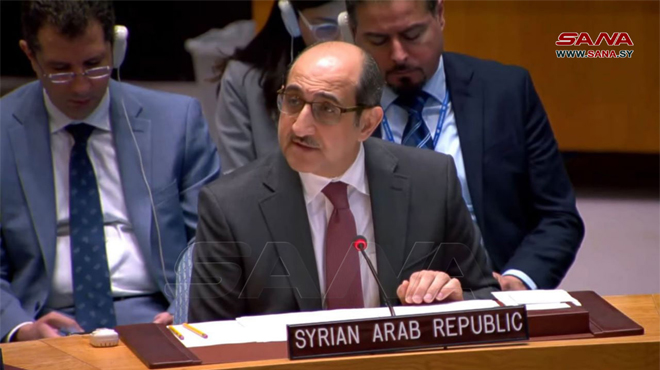Sabbagh: Humanitarian situation in Syria requires sustainable solutions that support early recovery projects
Syria’s Permanent Representative to the United Nations Bassam Sabbagh affirmed that the humanitarian situation in Syria requires sustainable solutions that support the Syrians and that reduces dependence on life-saving humanitarian aid, stregthen their ability to withstand the difficult circumstances and support early recovery projects.
During a Security Council session on Thursday concerning the political and humanitarian issues in Syria, Sabbagh stressed the need not to politicize the issue of the refugees’ return or to prevent their return which requires the rehabilitation of the infrastructure necessary for their dignified return, including through financing efforts to remove the mines and explosive devices left by terrorists, and through implementing the donors’ pledges to fund the humanitarian response plan and early recovery projects. He pointing out that the immediate and unconditional lifting of unilateral coercive measures is a moral and humanitarian duty of the countries that impose them in order to stop starving the Syrian people.
Sabbagh explained that last week, the Security Council discussed aspects of implementing the provisions of Resolution 2672, assessing the progress in delivering humanitarian aid to the Syrians and providing them with basic services through early recovery projects.
During that session, Sabbagh clarified, the Syrian delegation indicated that the humanitarian needs in Syria are increasing and that access to basic services has become more limited, not to mention the severe water crisis, which has caused suffering to nearly a million Syrians in and around Hasakah Governorate. He added that the outbreak of cholera and the shortage in electricity have also exacerbated the suffering of the Syrians in all walks of lives.
Sabbagh went on to say that the unilateral coercive measures imposed by the United States and the European Union on Syria have impacted various humanitarian sectors in the country, indicating that all the so-called exceptions announced by the United States of America and the European Union in the post-earthquake period had no effect on the ground.
He pointed out that some European Union officials continue with their hostile stances towards Syria and keep politicizing the humanitarian issue there and trading in the suffering of the Syrians, by continuing to impose inhumane and immoral coercive measures, and by excluding the Syrian state from the Brussels donor conferences related to Syria.
He clarified that the pledges announced at the recent Brussels donors’ conference test the donor countries’ will and seriousness in fulfilling their obligations and excluding humanitarian work from any political agenda. He reiterated that all donors’ conferences cannot compensate for what has been stolen from the wealth of the Syrian people by the foreign occupation forces over the years of the crisis.
Sabbagh noting the deteriorating security and humanitarian situation in the refugee camps located in the areas controlled by the US forces which are illegally present on Syrian territory, stressing that Washington bears responsibility for this situation because of its destructive policies towards Syria that brought millions of Syrians to a state of insecurity and stability, and turned many of them into refugees and displaced persons.
Sabbagh also talked about the continuous violations of the Israeli occupation against the people in the occupied Syrian Golan and stressed Syria’s condemnation of the illegal practices of the Israeli entity in the occupied Syrian Golan, mainly the plan to build wind turbines on Golan’s agricultural lands, calling on the Security Council to fulfill its responsibilities, put an end to all policies of occupation and hold the perpetrators accountable.
Hamda Mustafa

